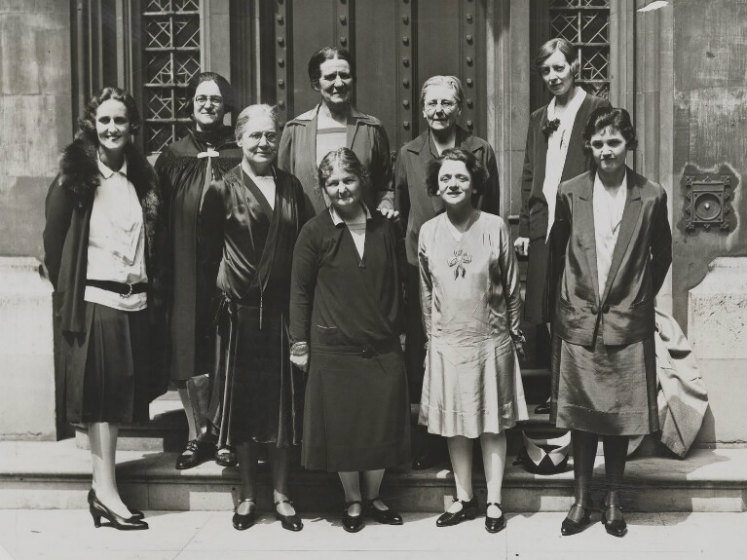 Women Labour MPs, 1929. Credit NPG.
Women Labour MPs, 1929. Credit NPG.
Front row, left to right: Lady Cynthia Mosley (1898-1933), Miss Susan Lawrence (1871-1947), the Rt Hon Margaret Bondfield (1873-1953), Miss Ellen Wilkinson (1891-1947), Miss Jennie Lee (1904-1988). Back row: Dr Marion Phillips (1881-1932), Miss Edith Picton-Turberville (1872-1960), Dr Ethel Bentham (1861-1931), Miss Mary Agnes Hamilton (1882-1966). This photograph was taken to mark the first election following the introduction of universal suffrage in 1928. Among the MPs photographed are the first woman cabinet minister (Margaret Bondfield), the future leader of the Jarrow marchers (Ellen Wilkinson) and the founding spirit of the Open University (Jennie Lee).
The history of women LSE graduates who have been elected to the House of Commons is long and illustrious. Women who blazed a political trail, challenged the patriarchy and stuffy rigidity of Westminster, and represented their local areas with passion and commitment.
The first LSE alumna to be elected was Marion Philips, who served the Sunderland constituency between 1929 and 1931. She worked directly with Beatrice Webb, one of LSE’s founders, and was Secretary of the Women’s Labour League, advising Government on many policy issues, before becoming an MP. She fought to bring more women into politics and build an appreciation of the importance of a clean and happy home life into the heart of political debate. She may have only served as MP for two years, dying shortly after losing her seat, but her legacy lives on.
In 1974, LSE alumna Maureen Colquhoun was elected as the Labour MP for Northampton North. A year later, she came out and became the first openly gay women to serve in the Commons. She fought for women’s rights and the protection of prostitutes throughout her time in Parliament, and her feminist campaigning led her own local party members to try and get rid of her. She lost her seat in the 1979 election that swept Margaret Thatcher to power.
Four years later the charismatic Edwina Currie was elected Conservative MP for South Derbyshire. She unapologetically took centre stage on a number of controversial issues and was quickly promoted to government, before resigning as Health Minister in 1988 after in the wake of a salmonella scare in British eggs. From the backbenches she campaigned to lower the age of consent for homosexual sexual acts to 16 and was the first MP to appear on satirical British panel show Have I Got News for You. Edwina lost her seat in 1997 and continues to speak out on political issues.
In 2015 Jo Cox, who had studied at LSE’s European Institute, was elected MP for Batley and Spen. She quickly made a name for herself by campaigning tirelessly to help improve people’s lives, bringing together politicians of differing viewpoints in pursuit of an end to the Syrian Civil War and tackling Islamophobia. She was murdered in her constituency in 2017, and her legacy is celebrated through the Great Get Together which brings communities together in remembrance of Jo’s belief that “We are far more united and have far more in common than that which divides us”.
And LSE women continue to make a difference in the Government and in the Commons – Margot James MP, who studied Government and Economics, is now Minister for Digital and the Creative Industries, while Anneliese Dodds MP, who also studied Government, has a leading role in the Opposition Treasury team. And Jo Swinson MP, who studied Management, is now Deputy Leader of the Liberal Democrats.
LSE alumna also have high-profile roles scrutinising Government and holding ministers to account - Rachel Reeves MP chairs the Business Select Committee, Rt Hon Maria Miller MP chairs the Women and Equalities Committee, Rt Hon Yvette Cooper MP chairs the Home Affairs Committee and Mary Creagh MP chairs the Environmental Audit Committee.
And LSE MP alumna are also using their position to campaign for a better society – Rebecca Harris MP as co-chair of APPG of on Fuel Poverty and Energy Efficiency, Stella Creasy MP campaigns for fairer pay and against high-cost credit, while Karen Buck MP is a leading campaigner on homelessness and Rt Hon Dame Margaret Hodge MP is a tireless campaigner for equality.
LSE alumni throughout the last two centuries have played a role in representing their constituents, and their interests and concerns, from across the UK and holding the government of the day to account. Current and future alum who enter Parliament will join the eminent ranks of women who have played a part in one of the world’s most famous democracies. We will be asking just some of the LSE women currently in Parliament about their unique paths to power in the next post.
Read more
#LSEWomen in Parliament 2018
Marion Phillips
A Woman of Vision – A life of Marion Phillips, MP by Marian Goronwy- Roberts (2000)
A Woman in the House by Maureen Colquhoun (1980)
Edwina Currie: Diaries 1987-1992 (2002)
Find your MP
Women in the House of Commons